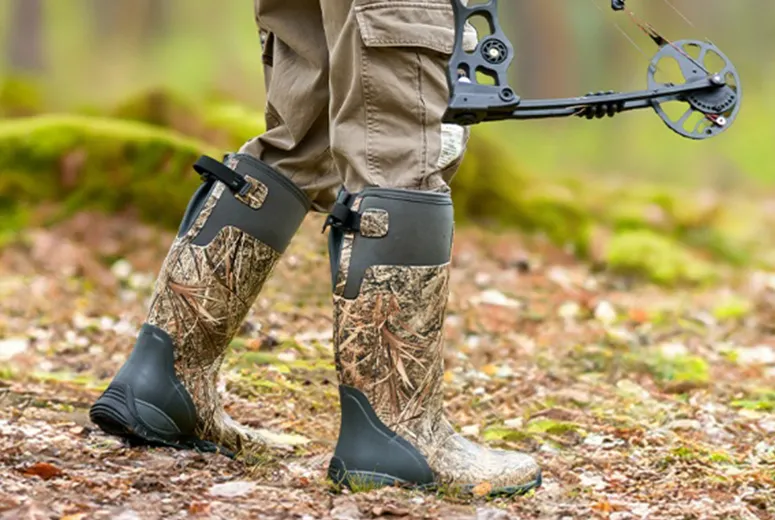Rocky terrains present unique challenges for outdoor enthusiasts, whether you’re trekking through rugged mountainside trails, navigating slippery riverbanks, or stalking game in uneven wilderness. The right footwear isn’t just a luxury—it’s a necessity. Hunting and fishing boots designed for rocky landscapes must balance durability, comfort, and protection to keep you steady and focused on your adventure. In this guide, we’ll explore what makes good hunting boots exceptional, how to find cheap fishing boots without sacrificing quality, and answer common questions to help you make an informed decision.

The Importance of Quality Hunting and Fishing Boots for Rocky Terrains
When navigating rocky terrains, your boots are your first line of defense against injuries, fatigue, and the elements. Hunting and fishing boots built for such environments prioritize features like reinforced soles, ankle support, and waterproof materials. Let’s break down why investing in quality matters:
Durability That Withstands the Test of Time
Rocky landscapes are unforgiving. Sharp stones, abrasive surfaces, and constant friction can wear down poorly constructed boots within months. High-quality hunting and fishing boots use materials like full-grain leather, rugged rubber outsoles, and reinforced toe caps to resist tearing and punctures. These boots are designed to endure years of use, making them a cost-effective choice in the long run.
Traction and Stability on Uneven Ground
Slipping on loose gravel or wet rocks isn’t just inconvenient—it’s dangerous. Premium boots feature deep-lugged soles with multidirectional treads that grip uneven surfaces securely. Additionally, stiff midsoles provide stability, reducing the risk of ankle rolls during steep climbs or sudden movements.
Weather Resistance for All-Season Performance
Whether you’re wading through streams or braving muddy trails, waterproofing is non-negotiable. Look for boots with sealed seams, moisture-wicking liners, and breathable membranes like Gore-Tex. These features keep your feet dry in wet conditions while preventing overheating during long hikes.
What Makes Good Hunting Boots Stand Out?
Good hunting boots are more than just sturdy footwear—they’re engineered to enhance your performance in the wild. Here’s what sets them apart:
Stealth-Optimized Design
Hunting requires silence. Boots with noise-reducing soles and soft, flexible materials help you move quietly through forests or rocky outcrops. Avoid stiff boots that crunch underfoot and scare off game.
Insulation for Cold-Weather Hunts
Early mornings in rocky terrains often mean freezing temperatures. Insulated good hunting boots retain body heat without adding bulk. Thinsulate or PrimaLoft linings are popular choices, offering warmth even when wet.
Ankle Support for Heavy Loads
Carrying gear over rocky terrain demands exceptional ankle support. High-cut boots with padded collars and rigid shanks stabilize your feet, reducing fatigue during multi-day trips.
Camouflage and Scent Control
Some good hunting boots incorporate scent-blocking technology and camouflage patterns to help you stay undetected. This is especially crucial for hunters tracking sensitive prey like deer or elk.
Finding Affordable Options: Cheap Fishing Boots Without Compromising Quality
Fishing in rocky rivers or coastal areas requires specialized footwear, but that doesn’t mean you have to overspend. Cheap fishing boots can still deliver reliability if you know what to prioritize:
Lightweight Construction for Agility
Fishing often involves quick movements across slippery rocks. Affordable options made from synthetic materials like nylon or neoprene are lightweight and dry quickly, making them ideal for casting lines or wading.
Non-Slip Outsoles for Wet Surfaces
Look for cheap fishing boots with rubber outsoles designed for wet traction. Patterns inspired by tire treads or hexagonal grips provide stability on algae-covered stones.
Drainage Systems to Prevent Water Buildup
Unlike waterproof hunting boots, some fishing boots prioritize drainage. Mesh panels or strategic perforations let water escape, keeping your feet comfortable during long hours in the water.
Balancing Cost and Longevity
While cheap fishing boots may lack premium leather or advanced insulation, they can still offer value. Focus on reinforced stitching, corrosion-resistant hardware, and replaceable insoles to extend their lifespan.
FAQs About Hunting and Fishing Boots
Why Should I Invest in Good Hunting Boots for Rocky Terrains?
Good hunting boots are designed to enhance safety and performance. They offer ankle support, noise reduction, and weather resistance—features that prevent injuries and help you stay focused on your hunt.
Are Cheap Fishing Boots Durable Enough for Rocky Terrains?
Yes! Many cheap fishing boots use synthetic materials that resist abrasion and dry quickly. Look for reinforced toes and thick outsoles to ensure they withstand sharp rocks.
How Do Hunting and Fishing Boots Improve Traction on Slippery Surfaces?
Both types of boots use deep treads and rubber compounds optimized for grip. Hunting boots often prioritize multidirectional lugs, while fishing boots focus on wet-surface traction.
What Features Should I Prioritize in Good Hunting Boots?
Focus on waterproofing, ankle support, insulation, and noise reduction. These elements ensure comfort and stealth in challenging environments.
Can Cheap Fishing Boots Provide Adequate Waterproofing?
While not all budget options are fully waterproof, many offer water-resistant treatments. Pair them with waterproof socks for added protection in shallow streams.
Choosing the right hunting and fishing boots for rocky terrains is about balancing your needs with your budget. Whether you opt for good hunting boots with advanced insulation or cheap fishing boots that prioritize agility, prioritize features that enhance safety and durability. With the right pair, you’ll conquer rocky landscapes with confidence—and focus on the thrill of the adventure ahead.
-
Stay Dry in Any Condition with WadersNewsJul.17,2025
-
Elite Performance with Camouflage Combat BootsNewsJul.17,2025
-
Dry and Comfortable with Green Rubber Garden ShoesNewsJul.17,2025
-
Convenient Protection with Foldable RainbootsNewsJul.17,2025
-
Comfort and Protection with Neoprene Work BootsNewsJul.17,2025
-
Brighten Rainy Days with Floral Rain BootsNewsJul.17,2025
-
Safety Wellies: The Ultimate Combination of Protection, Comfort, and VisibilityNewsJun.19,2025











